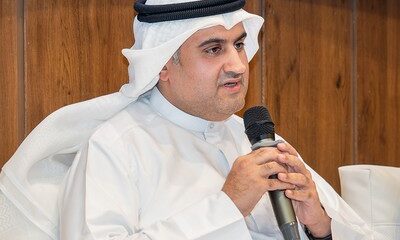KUWAIT: Minister of Health Dr Ahmad Al-Awadhi affirmed that medical laboratories form a cornerstone of the healthcare system, playing a vital role in diagnosis, treatment, prevention and improving service efficiency. He said the ministry places strong emphasis on developing this sector by enhancing both its human resources and technical capacity in line with the latest international standards.
His remarks came in a speech delivered Monday at the opening of the 7th Medical Laboratories Conference, organized by the Council of Medical Laboratories Departments and the Medical Laboratory Services Department at the Ministry of Health under the theme “Developments in Diagnostic Hematology and Precision Medicine – Future Trends in Diagnostic Laboratories.” Al-Awadhi said the conference serves as a scientific platform bringing together specialists and experts from inside and outside Kuwait to exchange experience, strengthen research cooperation and help improve the quality of health services.
He noted the ministry is working to expand laboratory services across all health facilities and develop them both quantitatively and qualitatively by appointing qualified technical staff, equipping laboratories with advanced systems and technologies, and applying the highest quality standards locally and internationally. This approach, he said, ensures accurate and reliable results that improve diagnostic efficiency and speed up treatment. The minister highlighted the essential role of blood bank laboratories in ensuring safe transfusions and providing units of all blood types. He stressed these laboratories serve as a first line of defense in early detection of complex diseases, contributing to higher treatment success rates and reducing long-term complications and costs.
Minister of Health Dr Ahmed Al-Awadi inaugurates the 7th Medical Laboratories Conference.- KUNA photos
He further underlined the preventive importance of services such as premarital testing, which help protect future generations by identifying genetic and infectious diseases and ensuring health compatibility between couples, thus supporting stronger, healthier families and a more informed society. Al-Awadhi said the progress achieved in this field reflects the ministry’s vision to establish advanced, safe healthcare foundations and adopt a comprehensive development approach to build a modern laboratory system that keeps pace with future trends.
For her part, head of the conference organizing committee Dr Ibtisam Juma said the conference represents a strategic platform that promotes integration between scientific research and clinical practice, while highlighting the leading role of laboratory medicine in shaping the future of healthcare. She described the event as a qualitative step toward building scientific partnerships and exchanging expertise to empower national competencies and develop health services in accordance with top international standards. Juma noted that discussions will also address the ethical dimensions of personalized healthcare amid rapid technological advances.
Thirteen speakers from outside Kuwait are participating, representing experts from the GCC, Arab and European countries — a reflection of the conference’s international character and scientific breadth. Juma said the agenda covers pivotal topics, including developments in hematology and oncology, artificial intelligence applications in laboratory diagnostics, predictive biomarkers and transfusion medicine. She noted that hematology laboratories in Kuwait include 67 doctors, among them 13 consultants who oversee performance quality and result accuracy. Since the start of 2025, hematology labs have received more than three million samples, conducting over seven million tests — a figure that reflects both the workload and operational efficiency of the country’s laboratory network, she said. She added that the adoption of the latest technological systems has significantly reduced human error, improved service quality and enhanced result accuracy, enabling physicians to make critical clinical decisions promptly. Juma pointed out that infrastructure has expanded notably through the rehabilitation of existing labs and the opening of new facilities in line with population growth and geographic development across all governorates. — KUNA
Hematology laboratories currently serve seven public hospitals and specialized centers in all six governorates, in addition to primary healthcare centers, ensuring nationwide coverage and fast, accurate diagnostic services for citizens and residents. She stressed the achievements in laboratory services embody the ministry’s commitment to an ambitious vision focused on improving healthcare quality, embracing innovation, promoting a culture of excellence and creating a pioneering model for modern laboratory medicine. – KUNA



















